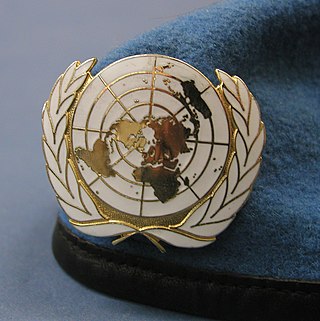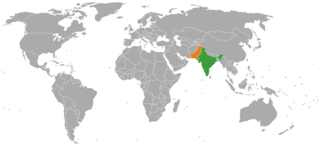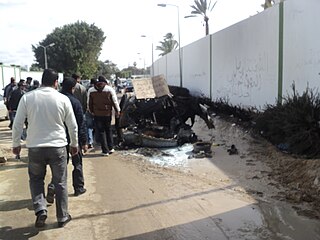
The United Nations Security Council (UNSC) is one of the six principal organs of the United Nations (UN) and is charged with ensuring international peace and security, recommending the admission of new UN members to the General Assembly, and approving any changes to the UN Charter. Its powers as outlined in the United Nations Charter include establishing peacekeeping operations, enacting international sanctions, and authorizing military action. The UNSC is the only UN body with authority to issue resolutions that are binding on member states.

The member states of the United Nations comprise 193 sovereign states. The United Nations (UN) is the world's largest intergovernmental organization. All members have equal representation in the UN General Assembly.
China is one of the members of the United Nations and is one of five permanent members of its Security Council. One of the victorious Allies of World War II, the Republic of China (ROC) joined the UN upon its founding in 1945. The subsequent resumption of the Chinese Civil War between the government of Republic of China and the rebel forces of the Chinese Communist Party, led to the latter's victory on the mainland and the establishment of the People's Republic of China (PRC) in 1949. Nearly all of Mainland China was soon under its control and the ROC government retreated to the island of Taiwan.

United Nations Security Council Resolution 425, adopted on 19 March 1978, five days after the Israeli invasion of Lebanon in the context of Palestinian insurgency in South Lebanon and the Lebanese Civil War, called on Israel to withdraw immediately its forces from Lebanon and established the United Nations Interim Force In Lebanon (UNIFIL). It was adopted by 12 votes to none; Czechoslovakia and the Soviet Union abstained, and China did not participate.

The United Nations Organization Stabilization Mission in the Democratic Republic of the Congo or MONUSCO, an acronym based on its French name Mission de l'Organisation des Nations Unies pour la stabilisation en République démocratique du Congo, is a United Nations peacekeeping force in the Democratic Republic of the Congo (DRC) which was established by the United Nations Security Council in resolutions 1279 (1999) and 1291 (2000) to monitor the peace process of the Second Congo War, though much of its focus subsequently turned to the Ituri conflict, the Kivu conflict and the Dongo conflict. The mission was known as the United Nations Mission in the Democratic Republic of Congo or MONUC, an acronym of its French name Mission de l'Organisation des Nations Unies en République démocratique du Congo, until 2010.
The Karachi Agreement of 1949 was signed by the military representatives of India and Pakistan, supervised by the United Nations Commission for India and Pakistan, establishing a cease-fire line in Kashmir following the Indo-Pakistani War of 1947. It established a cease-fire line which has been monitored by United Nations observers from the United Nations since then.

The United Nations has played an advisory role in maintaining peace and order in the Kashmir region soon after the independence and partition of British India into the dominions of Pakistan and India in 1947, when a dispute erupted between the two new States on the question of accession over the princely state of Jammu and Kashmir. India took this matter to the UN Security Council, which passed resolution 39 (1948) and established the United Nations Commission for India and Pakistan (UNCIP) to investigate the issues and mediate between the two new countries. Following the cease-fire of hostilities, it also established the United Nations Military Observer Group in India and Pakistan (UNMOGIP) to monitor the cease-fire line.

United Nations Security Council Resolution 39, adopted on January 20, 1948, offered to assist in the peaceful resolution of the Kashmir Conflict by setting up a commission of three members; one to be chosen by India, one to be chosen by Pakistan and the third to be chosen by the other two members of the commission. The commission was to write a joint letter advising the Security Council on what course of action would be best to help further peace in the region.

United Nations Security Council Resolution 47, adopted on 21 April 1948, concerns the resolution of the Kashmir conflict. After hearing arguments from both India and Pakistan, the Council increased the size of the UN Commission created by the former Resolution 39 to five members, instructed the Commission to go to the subcontinent and help the governments of India and Pakistan restore peace and order to the region and prepare for a plebiscite to decide the fate of Kashmir.

United Nations Security Council Resolution 80, adopted on March 14, 1950, having received the reports of the Commission for India and Pakistan, as well as a report from General A. G. L. McNaughton, the Council commended India and Pakistan for their compliance with the ceasefire and for the demilitarization of Jammu and Kashmir and agreement on Fleet Admiral Chester W. Nimitz as the future Plebiscite Administrator.

United Nations Security Council Resolution 91, adopted on March 30, 1951, noting a report by Sir Owen Dixon, the United Nations Representative for India and Pakistan, stating that the main point of difference of preparing the state of Jammu and Kashmir for the holding of a plebiscite were as follows; the procedure for and extent of demilitarization, the degree of control over the exercise of the functions of government necessary to ensure a free and fair plebiscite.

United Nations Security Council Resolution 96, adopted on November 10, 1951, having received a report by Mr. Frank Graham, the United Nations representative for India and Pakistan, as well as hearing his speech before the Council a basis for a program of demilitarization was noted with approval. The Council noted with gratification the declaration by both India and Pakistan that they would work for a peaceful settlement, continue to observe a cease-fire and accepted the principle that the accession of the State of Jammu and Kashmir should be determined by a free and impartial plebiscite under the auspices of the United Nations. The Council then instructed the UN Representative to continue in his efforts to obtain agreement of the parties on a plan for effecting the demilitarization of the State of Jammu and Kashmir and to report back on his efforts together with his view concerning the problems confided to him within six weeks.

The Republic of India recognised Ukraine as a sovereign country in December 1991 following the dissolution of the Soviet Union and established diplomatic relations in January 1992. The Indian Embassy in Kyiv was opened in May 1992 and Ukraine opened its Mission in New Delhi in February 1993. The Consulate General of India in Odesa functioned from 1962 until its closure in March 1999.

The first emergency special session of the United Nations General Assembly was convened on 1 November and ended on 10 November 1956 resolving the Suez Crisis by creating the United Nations Emergency Force (UNEF) to provide an international presence between the belligerents in the canal zone. The emergency special session was convened due to the failure of the Security Council to resolve the instability at the Suez Canal, invoking "Uniting for Peace" resolution which transferred the issue from the Security Council to the General Assembly in its Emergency Special Session (ESS) guise. On the fourth day of the ESS the Canadian representative, Lester B. Pearson, introduced the concept of a UN police force. The creation of the United Nations Emergency Force was approved by the General Assembly with 57 supports and zero opposes. The vote had 19 countries abstaining, including the United Kingdom, France, Egypt, the Soviet Union and several Eastern European countries.

United Nations Security Council resolution 1172, adopted unanimously on 6 June 1998, after hearing of nuclear tests conducted by India and Pakistan in May 1998, the Council condemned the tests and demanded that both countries refrain from engaging in further tests.

The Constituent Assembly of Jammu and Kashmir was a body of representatives elected in 1951 to formulate the constitution of Jammu and Kashmir. The Constituent Assembly was dissolved on 26 January 1957, based on Mir Qasim resolution it adopted and ratified the constitution of jammu and kashmir on 17 November 1956.
Pakistan officially joined the United Nations (UN) on 30 September 1947 just over a month after it came into existence. Today, it is a charter member and participates in all of the UN's specialised agencies and organisations. Pakistan has been elected seven times into the UN Security Council, with the most recent term in 2013. It is also one of the countries which has had a diplomat, Muhammad Zafarullah Khan, serve a term as the President of the United Nations General Assembly.

United Nations Security Council Resolution 1970 was a measure adopted unanimously by the UN Security Council on 26 February 2011. It condemned the use of lethal force by the government of Muammar Gaddafi against protesters participating in the Libyan Civil War, and imposed a series of international sanctions in response.

The permanent members of the United Nations Security Council are the five sovereign states to whom the UN Charter of 1945 grants a permanent seat on the UN Security Council: China, France, Russia, United Kingdom, and United States.

The eleventh emergency special session of the United Nations General Assembly opened on 28 February 2022 at the United Nations headquarters. It addresses the Russian invasion of Ukraine. Maldivian politician Abdulla Shahid served as President of the body during this time.














